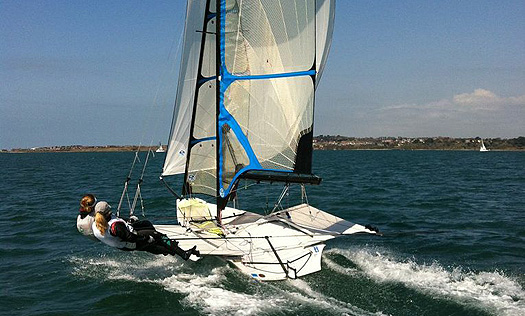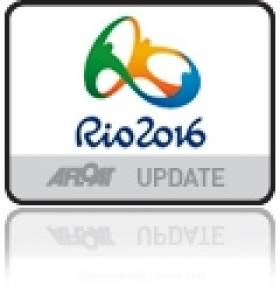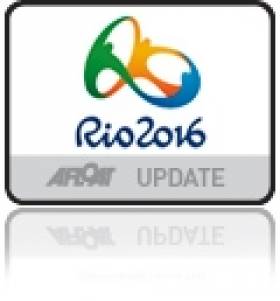Displaying items by tag: Claudine Murphy
Claudine Murphy & Andrea Brewster. 49er FX Skiff Campaigners
Annalise Murphy's older sister Claudine has announced plans to join Annalise on Rio's Guanabara Bay in the latest Irish women's skiff campaign.
Claudine has teamed up with former British trialist Andrea Brewster in a bid for the Irish 49erfx slot against Tiffany Brien and Saskia Tidey also seeking a place in the official squad and a place in this new class for the Rio games.
Here Claudine gives some background on her campaign:
I met Andrea for the first time at the 2004 Laser Radial Europeans in Bangor. Andrea has been sailing the laser full time since then and was Annalise's training partner for the London Games. Annalise had joked about us teaming up in the FX for 2016 but we did not look into it seriously until February of this year. Andrea has dual citizenship so decided to use this to team up with me and start a campaign. She has been in the top 30 in the world consistently from 2005 to 2012 in the laser radial, her most notable result being a bronze medal at the 2008 Laser Radial Worlds. We both decided we had similar ambitions in our sailing and are at a position to go full time to give it a proper go.
We intend on debuting at Sail for Gold in Weymouth where we have been training for the past five weeks. Portland harbour is ideal for learning how to skiff sail as it is large and relatively obstacle free! We then plan on attending the next European cup event in Kiel followed by the Europeans in Denmark. There is then quite a large gap until the worlds in Marseille in mid September.
Our short term goals are to make ISC funding so we can progress forward into 2014 with support. Our main goal for now is to learn to control the boat in all conditions. Skiff sailing in a breeze is more extreme than any kiteboarding or skiing I have done in my last year of travelling! We have had some very comical scenarios in this learning process which makes the terror and injuries sustained worthwhile! I am also very glad of the fitness I worked on last year when I rowed for DULBC while doing my Masters in Trinity. Skiff crewing is very physical so my fitness regime has increased dramatically in the past few months. Long term it will be important to qualify the nation in Santandar next September as it will be much more difficult to do so with the new continent divisions in nation places for 2016.
I think the difficult thing about sailing a double handed boat is finding somebody you can have a successful working partnership with. But I am delighted to have found somebody to sail with who is so talented and dedicated to Olympic sailing as Andrea is. We are basing ourselves in DunLaoghaire from now so between ourselves and Annalise in her moth we will give the pier onlookers lots of entertainment this summer!

Claudine and Andrea in flying form in a training session in Weymouth. Photo:Tom Peel
Below Andrea also gives some background to the new campaign:
Towards the end of last year I made the decision to sail the 49erFX which is the new Women's Skiff Class in for Rio 2016. The FX is by far the most exciting class ever to be brought in for Women to sail at the Olympics and I could not resist the opportunity to sail full time in such a fantastic boat. So I bought an FX and with the help of some good friends I began learning to try and master the art of skiff sailing.
The difficulty I have found about learning to sail the FX is that as a beginner its fairly risky to go sailing in anything much above 15 knots so that immediately reduced the amount of days I was able to train. Between October and March I think I managed to do about 3 weeks of sailing in total as either there was too much wind or I was unable to find anyone to sail with. I started looking for someone to team up with to get a campaign underway back in September and despite trying out with some very good sailors I was unable to find anyone in a position to be able to sail full time with me. After such a slow start and still no full time crew I was beginning to wonder if I was realistically going to be able to continue campaigning. I thought back to conversations I'd had with my great friend and training partner for the last few years in the Radial, Annalise Murphy from Ireland. We used to joke that I should become Irish and sail a skiff with Annalise's sister Claudine for 2016. At the time it sounded pretty far fetched but nearly 6 months after buying my FX and no further on with a campaign I realised that this might be the only opportunity I might have. My Mum's side of the family are all of Irish descent, so I knew that I could be eligible to sail for Ireland. After talking it through with Claudine and discovering that she was also at a cross roads in life which meant she could go full time if sailing if she wanted, we decided to try out together in the FX. We discussed things in great detail and I was pleased to learn that we both shared the same aspirations for the campaign and from there we decided to seize the opportunity and go for it!
So I am now pleased to officially announce that Claudine Murphy and I are campaigning for Rio 2016 sailing for Ireland. We are only a few weeks into our training so far but as you can see from the picture we are throwing ourselves into it!
I am very grateful for all the support and encouragement I have received so far from everyone about my decision to switch to sail for Ireland. I have many fond and proud memories of my time representing Britain and I am now looking forward to this next exciting chapter in my life!
Bitter Blow for Kites as Windsurfing is Reinstated in Olympics
#OLYMPICS - Windsurfing has been reinstated in the Olympic Games programme at the expense of new class kitesurfing after a vote by the International Sailing Federation (ISAF) yesterday, as Eurosport reports.
It had been expected that sailing's world governing body would reach a compromise of sorts at its annual general meeting in Dun Laoghaire by keeping both classes in the Rio Games in 2016.
The original decision to replace windsurfing with the new sport of kitesurfing back in May was considered a surprise move, but the ISAF has surprised again with its reversal of that decision.
Windsurfing's supporters were said to be "shell-shocked" by the original vote, and vowed to lobby the ISAF to overturn the decision in Dublin, for which they needed a two-thirds majority.
Israel's sailing head Yehuda Maayan told Reuters that delegates had likely been confused about the original vote because of language difficulties, noting that the Spanish delegate had voted for kiteboarding by mistake.
Among those expressing their disappointment at the about face was Virgin founder Richard Branson, who wrote on his blog that the ISAF had "have misled everybody and been very short-sighted in making this knee-jerk decision".
He added: "Their original decision was the right one and a brave one, although my own feeling is that there is room for both sports in the Olympics. If they had to drop anything it should have been one of the less exciting sailing races, which really don't capture the public's imagination."
The move is also a bitter blow for Irish kitesurfer Claudine Murphy, sister of Olympic star Annalise Murphy, who had been campaigning in the new class to make it a sister act at the Rio Games.
In other news from yesterday's ISAF AGM, new members of the ISAF Council have been announced.
Italy's Carlo Croce was elected president and chair of the council that also includes seven vice presidents: George Andreadis (Greece), Chris Atkins (UK), Adrienne Greenwood (New Zealand), Nazli Imre (Turkey), Gary Jobson (USA), Quanhai Li (China) and W Scott Perry (Uruguay).
Also on the council are a non-voting treasurer (yet to be confirmed), 28 representatives from member national authorities (MNAs) and individual representatives from the athletes' commission, the ISAF classes, offshore sailing and women's sailing. Sailing.org has full details on the new council HERE.
from ISAF
Kiteboards Out / Windsurfing Back In
Dun Laoghaire, Ireland: After three days of meetings, the ISAF Annual Conference drew to a close Saturday as the final decisions affecting the sport moving forward were made.
23 submissions relating to the events and equipment for Rio 2016 were received by ISAF in advance of the Conference. In accordance with the ISAF Regulations, before the detail of any of these particular submissions could be discussed, Council were required to vote on a motion to re-open the debate on the subject. The Regulations specify that 75% of members must agree to the motion.
The submissions were presented as six proposals and Council asked to vote on them in terms of the specific changes they proposed. The first proposal grouped. 26 Council members voted in favour and 12 were against.
Proposal 2, which featured Submission 063-12, related to Men's Kiteboarding, Women's Kiteboarding and 2nd One Person Dinghy - Finn. 14 Council members voted in favour and 23 were against and 1 abstained.
With 38 possible votes, the 75% requirement was not achieved on either proposal so the events and equipment as approved in May 2012 remain for Rio 2016.
However, at the ISAF General Assembly part of the business for the 106 Member National Authorities (MNAs) who were present was to review any regulations made or amended in any substantive way by Council since the last Ordinary Meeting which was in November 2011.
ISAF had been notified of three amendments proposed by MNAs which concerned the first two lines of Regulation 23.1.4 (Men's and Women's Kiteboarding).
As defined in the Articles of ISAF, decisions at the General Assembly shall be taken by a simple majority of votes of those present and entitled to vote. There were 114 possible voters, including the ISAF President and Vice-Presidents.
After a lengthy debate the MNAs approved the first proposal which reinstated Men's and Women's Boards - RS:X.
ISAF Regulation 23.1.4 now reads:
Men's Board - RS:X
Women's Board - RS:X
Men's One Person Dinghy - Laser
Women's One Person Dinghy - Laser Radial
Men's 2nd One Person Dinghy - Finn
Men's Skiff - 49er
Women's Skiff - 49erFX
Men's Two Person Dinghy - 470
Women's Two Person Dinghy - 470
Mixed Two Person Multihull - Nacra 17
sailing.org
Irish Sailing's Sister Act Plan on Rio 2016
#RIO 2016 – It's well known that Annalise Murphy was barely off the water in Weymouth before she committed herself to a further few years sailing hard in the Laser Radial class for the 2016 Olympic Games in Rio de Janeiro.
What's probably less well known is that older sister Claudine has also set her sights on Brazil, campaigning in the new Olympic kitesurfing class.
News of the double campaign in the Murphy household was revealed in The Irish Times by Pamela Duncan prior to Annalise's medal race a week ago.
Claudine says there was "big rivalry" between her and Annalise as both pursued success in the Laser Radial, but they also realised that only one of them could represent Ireland in the class at Olympic level. Annalise showed the potential, and Claudine turned her hand to a different class.
“She’s my best friend in the whole world,” says Claudine, who flew in to support her sister from the Caribbean where she is already hard at work campaigning for a spot at the Rio Games in kitesurfing - a somewhat controversial addition to the Olympic schedule.
Meanwhile, Annalise Murphy and the Irish sailing team were welcomed home with a guard of honour at the National Yacht Club in Dun Laoghaire yesterday evening.
Annalise also announced plans to take things relatively easy for the next year, returning to UCD next month for a science degree.
"I deferred it three years ago as I didn’t want to put a half-hearted approach into college or sailing," she said. "I’m older now and I feel like I can manage things better.”































































